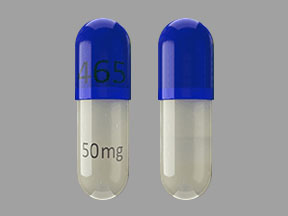Mydayis ER Capsules Dosage
Generic name: DEXTROAMPHETAMINE SACCHARATE 1.25mg, AMPHETAMINE ASPARTATE MONOHYDRATE 1.25mg, DEXTROAMPHETAMINE SULFATE 1.25mg, AMPHETAMINE SULFATE 1.25mg
Dosage form: capsule, extended release
Drug class: CNS stimulants
Medically reviewed by Drugs.com. Last updated on Nov 7, 2023.
Pretreatment Screening
Prior to treating patients with dextroamphetamine saccharate, amphetamine aspartate monohydrate, dextroamphetamine sulfate, and amphetamine sulfate extended-release capsules, assess:
- for the presence of cardiac disease (i.e., perform a careful history, family history of sudden death or ventricular arrhythmia, and physical exam) [see Warnings and Precautions (5.2)].
- the family history and clinically evaluate patients for motor or verbal tics or Tourette's syndrome before initiating dextroamphetamine saccharate, amphetamine aspartate monohydrate, dextroamphetamine sulfate, and amphetamine sulfate extended-release capsules use [see Warnings and Precautions (5.9)].
General Administration Information
Individualize the dosage according to the therapeutic needs and response of the patient. Administer dextroamphetamine saccharate, amphetamine aspartate monohydrate, dextroamphetamine sulfate, and amphetamine sulfate extended-release capsules at the lowest effective dosage.
Based on bioequivalence data, patients taking divided doses of dextroamphetamine saccharate, amphetamine aspartate monohydrate, dextroamphetamine sulfate, and amphetamine sulfate tablets (immediate-release), (for example, twice daily), may be switched to dextroamphetamine saccharate, amphetamine aspartate monohydrate, dextroamphetamine sulfate, and amphetamine sulfate extended-release capsules at the same total daily dose taken once daily. Titrate at weekly intervals to appropriate efficacy and tolerability as indicated.
Dextroamphetamine saccharate, amphetamine aspartate monohydrate, dextroamphetamine sulfate, and amphetamine sulfate extended-release capsules may be taken whole, or the capsule may be opened and the entire contents sprinkled on applesauce. If the patient is using the sprinkle administration method, the sprinkled applesauce should be consumed immediately; it should not be stored. Patients should take the applesauce with sprinkled beads in its entirety without chewing. The dose of a single capsule should not be divided. The contents of the entire capsule should be taken, and patients should not take anything less than one capsule per day.
Dextroamphetamine saccharate, amphetamine aspartate monohydrate, dextroamphetamine sulfate, and amphetamine sulfate extended-release capsules may be taken orally with or without food.
Dextroamphetamine saccharate, amphetamine aspartate monohydrate, dextroamphetamine sulfate, and amphetamine sulfate extended-release capsules should be given upon awakening. Afternoon doses should be avoided because of the potential for insomnia.
Recommended Dosage in Pediatric Patients 6 to 12 Years
In pediatric patients 6 to 12 years of age with ADHD and are either starting treatment for the first time or switching from another medication, start with 10 mg once daily in the morning; daily dosage may be adjusted in increments of 5 mg or 10 mg at weekly intervals. When in the judgment of the clinician a lower initial dose is appropriate, patients may begin treatment with 5 mg once daily in the morning. The maximum recommended dose for children 6 to 12 years of age is 30 mg/day; doses greater than 30 mg/day have not been studied in children. Dextroamphetamine saccharate, amphetamine aspartate monohydrate, dextroamphetamine sulfate, and amphetamine sulfate extended-release capsules have not been studied in children under 6 years of age.
Recommended Dosage in Pediatric Patients 13 to 17 Years
The recommended starting dose for pediatric patients 13 to 17 years of age with ADHD and are either starting treatment for the first time or switching from another medication is 10 mg/day. The dose may be increased to 20 mg/day after one week if ADHD symptoms are not adequately controlled.
Recommended Dosage in Adults
In adults with ADHD who are either starting treatment for the first time or switching from another medication, the recommended dose is 20 mg/day.
Dosage in Patients with Renal Impairment
In adult patients with severe renal impairment (GFR 15 to < 30 mL/min/1.73m2), the recommended dose is 15 mg once daily in the morning. In pediatric patients (6 to 17 years of age) with severe renal impairment, the recommended dose is 5 mg once daily. The maximum dose for children 6 to 12 years of age with severe renal impairment is 20 mg once daily. Dextroamphetamine saccharate, amphetamine aspartate monohydrate, dextroamphetamine sulfate, and amphetamine sulfate extended-release capsules are not recommended in patients with end stage renal disease (ESRD) (GFR < 15 mL/min/1.73m2) [see Use in Specific Populations (8.6), Clinical Pharmacology (12.3)].
Dosage Modification Due to Drug Interactions
Agents that alter urinary pH can impact excretion and alter blood levels of amphetamines. Acidifying agents (e.g., ascorbic acid) decrease blood levels; adjust dextroamphetamine saccharate, amphetamine aspartate monohydrate, dextroamphetamine sulfate, and amphetamine sulfate extended-release capsules dosage based on clinical response [see Drug Interactions (7)].
Frequently asked questions
- How is Mydayis different from Adderall XR?
- How long does Adderall withdrawal last?
- How do you get rid of Adderall tongue?
- Adderall for Study: Does it Really Make You Smarter?
More about Mydayis (amphetamine / dextroamphetamine)
- Check interactions
- Compare alternatives
- Pricing & coupons
- Reviews (142)
- Drug images
- Latest FDA alerts (4)
- Side effects
- During pregnancy
- Generic availability
- FDA approval history
- Drug class: CNS stimulants
- En español
Patient resources
Other brands
Professional resources
Other brands
Related treatment guides
Further information
Always consult your healthcare provider to ensure the information displayed on this page applies to your personal circumstances.

